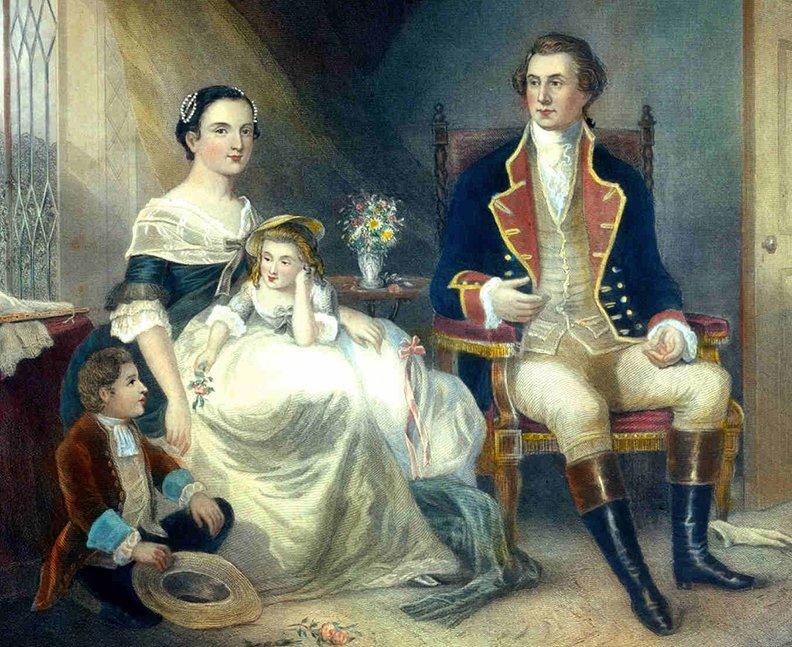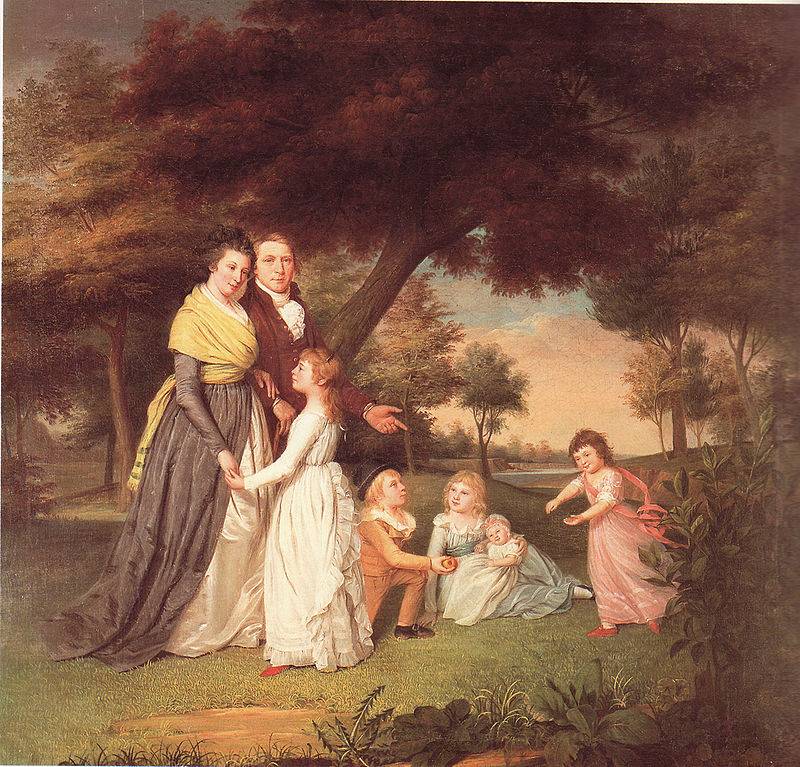The ideology of republican motherhood was a foundational element in the societal and political spheres of the late 18th century in the United States, following the Revolution. This concept extended beyond simple child-rearing practices; it was deeply woven into the democratic fabric of the emerging nation. The doctrine held that women, although not active participants in the political realm, bore the critical responsibility of instilling the virtues of liberty and civic duty in their sons.
Republican motherhood represented an indirect but potent form of influence on the political landscape of the new republic. Women were perceived as guardians of civic virtue and democratic ideals, tasked with the moral and intellectual cultivation of their children. This role served not only to elevate women’s stature within the home but also linked their maternal duties to the broader discourse on political and societal development.
In this way, by educating future citizens, women played an instrumental role in shaping the ideological and moral contours of early American society. Their contributions, though primarily manifested within the private spheres of family and education, were recognized as vital to the success and sustainability of the republic. This acknowledgment underscored the critical importance of women’s roles in nurturing the foundational principles of a burgeoning democracy.
Historical roots of republican motherhood
The term republican-motherhood captures a transformative ideology from the late 18th century that arose in the United States following the American Revolution. The question of what was the republican motherhood finds its answer in the societal reevaluation of women’s roles during this tumultuous period. Traditionally confined to the domestic sphere, women began to be seen as pivotal in nurturing the civic virtues of the young republic within their families, particularly through the education of their children.
This ideology extended beyond mere mothering; it charged women with the duty of instilling the nascent republic’s values of democracy and liberty in their offspring. Women were encouraged to educate themselves and, in turn, to educate their sons to be virtuous citizens and their daughters to be prudent mothers of future patriots. This educational imperative marked a significant departure from previous roles, blending family duties with nationalistic responsibilities.
In essence, motherhood was an expectation that women would cultivate a home environment that promoted the principles of republicanism, thereby contributing to the stability and morality of the state. This role was both a recognition of women’s importance in American society and a strategic maneuver to ensure the survival and integrity of republican values. Through this framework, women were acknowledged not only as caregivers but also as essential bearers of cultural and political ethos, indirectly influencing the political landscape of early America.

Defining republican motherhood
The concept of republican motherhood encapsulates a specific definition that arose during the formative years of the United States. It refers to an ideological expectation placed upon women to cultivate a deep sense of republicanism within their children, particularly their sons. This responsibility was seen as crucial for the continuance and strength of republican values in the new nation.
The republican motherhood definition emphasizes the influential role of mothers in the political and moral upbringing of future citizens. It was believed that a republic’s success depended significantly on the civic virtue and moral rectitude of its people. Therefore, mothers were tasked with the vital role of instilling qualities such as patriotism, virtue, and a sense of civic duty in their children.
This concept extended beyond mere child-rearing into the realm of educational advocacy, as it supported the idea that women needed to be well-educated to pass on important values effectively. Thus, republican-motherhood indirectly championed women’s education, making it a cornerstone for cultivating an enlightened citizenry.
Through this framework, women contributed significantly to the public sphere by ensuring their children, especially sons who would become voters and leaders, were prepared to uphold the principles of the republic. This role acknowledged and elevated the importance of women’s work within the domestic sphere, setting the stage for later advances in women’s rights and educational opportunities.
Significance and impact of republican motherhood
The concept of repub motherhood profoundly influenced American society, especially within education and the emergent civic roles for women. This ideological framework championed the role of mothers in instilling civic virtues and values of republicanism, which were deemed essential for nurturing the republic’s future leaders. The republican motherhood significance lies in its ability to extend beyond domestic roles to encompass educational reform and subtle political engagement.
Firstly, motherhood significantly enhanced educational opportunities for women. It underscored the belief that a well-educated woman was crucial for the development of principled citizens. This ideology catalyzed the establishment of female academies, such as the “Young Ladies’ Academy of Philadelphia,” reflecting an evolving perspective towards women’s education as foundational to societal progress.
Moreover, while women remained largely marginalized from direct political activities, motherhood facilitated a form of political engagement through the education of children and community involvement. This role enabled women to indirectly influence public policies and societal norms by shaping future generations’ views and behaviors.
The broader implications of republican motherhood also contributed to redefining women’s self-perceptions and their societal roles. It fostered a sense of agency and empowerment, setting the stage for future advocacy on women’s rights and suffrage. The focus on moral and educational upbringing not only prepared women for expanded roles but also laid the groundwork for significant societal reforms regarding women’s education and their participation in public life.
The significance of motherhood transcended traditional child-rearing duties, playing a pivotal role in educational reforms and fostering an environment where women could exert a significant, albeit indirect, influence on the political and social fabric of early America.
Exploring the legacy and importance
The concept of motherhood holds a significant place in the annals of American history, not only for its immediate impact on the post-revolutionary society but also for its enduring influence on contemporary views of gender roles in politics and education. Initially, this ideology empowered women to contribute to the civic discourse indirectly through the domestic sphere by nurturing the virtues of republicanism in their children. This responsibility underscored the importance of women’s roles in sustaining democratic ideals, albeit from a private, rather than public, platform.
Today, the legacy of this ideology is evident in the continued evolution of women’s roles within both the public and educational spheres. It laid the groundwork for the gradual acceptance of women as integral contributors to civic and political dialogues. The early emphasis on educating sons (and daughters, implicitly) fostered a broader societal recognition of the intellectual capabilities of women, leading to a reevaluation of their roles beyond the domestic sphere.
In modern contexts, the principles of this historical concept resonate with ongoing debates about gender equality and the involvement of women in leadership and educational reforms. The ideological lineage can be traced to current advocacy for equal educational opportunities and the push for greater female representation in political and civic arenas. This historical concept has morphed into a broader movement that challenges traditional gender norms and advocates for substantial roles for women in shaping societal ideologies.
Moreover, it has prompted a reexamination of how educational curricula are developed, advocating for inclusivity and diversity that reflect democratic principles. This ideological heritage underscores the importance of education in cultivating informed citizens who appreciate the foundational values of their country.
In summary, why was republican motherhood important today lies in its historical role in shaping the early American political landscape and its lasting impact on modern conceptions of women’s roles in politics and education. The ideology not only highlights the progression of women’s societal contributions but also continues to inspire the ongoing struggle for gender equality and educational equity.
Exploring the lasting impact of republican motherhood

The ethos of motherhood during the post-Revolutionary War period significantly shaped the American societal landscape. By emphasizing the role of women in instilling virtues within their homes, this concept underscored the strategic position women held in molding future citizens equipped with democratic values.
The enduring significance of this motherhood concept goes beyond its historical roots, influencing educational reforms and evolving women’s roles in public and political arenas. It served as a precursor to more progressive movements aimed at expanding women’s rights, laying a foundational stone that would support future advocacies for suffrage and equality.
Moreover, this historical motherhood concept highlighted the blend of private responsibilities and public influence, offering a nuanced perspective on women’s capacities and societal roles. It challenged traditional gender confines and opened the door for broader interpretations of women’s contributions to societal progress.
Reflecting on this impactful concept, it is evident that it was not merely about promoting political ideology but nurturing a robust civil society. Its legacy remains significant, continuing to inform contemporary discussions around gender, education, and political engagement.
Leave a Reply